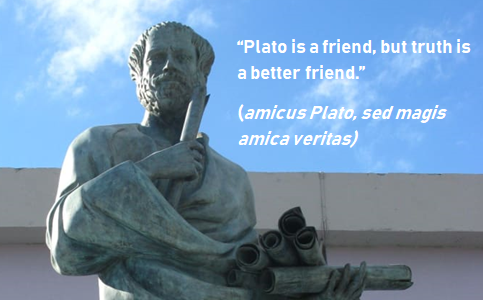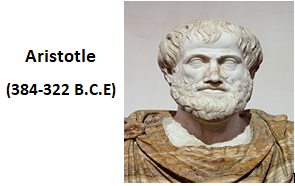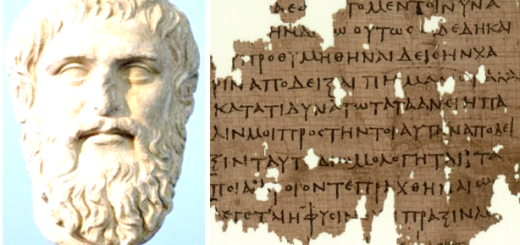Aristotle: Biography, Beliefs and Contributions
Aristotle was an ancient Greek philosopher, writer and biologist. He was born in the year 384 BCE in the Northern Greek city of Stagirus (or Stagira). His parents were aristocrats Nicomachus and Phaestis. Wanting more for himself and his family, Nicomachus journeyed to Macedonia and served as the personal physician of King Amyntas of Macedonia. This probably explains Aristotle’s fascination with biology and medicine. Some historians also believe that it is likely Nicomachus wanted his son to become a physician like him.
It was also around this time that Aristotle and King Amyntas’ son, Philip, developed a childhood friendship. Some accounts even claim that Aristotle spent most of his early years in the Macedonia king’s court. As we shall see in the following paragraphs, this relationship went on to produce something very amazing for the world.
Just as he was settling into the life in Macedonia and making friends, tragedy struck. Aristotle lost both parents when he was very young. His father’s death happened around when he was 10 years old. His uncle, Proxenus of Atameus, took Aristotle in and catered for him. Proxenus also tutored the young Aristotle on subjects such as rhetoric, poetry and Greek. Soon, Aristotle developed a passion for the natural sciences and anatomy. He also loved arts and philosophy.
Aristotle’s Time at Plato’s Academy
Aristotle’s thirst for education was obvious right from his childhood. And upon entering into his late teens, he traveled to Athens to enroll in Plato’s Academy in 367 B.C.E. Back then, the Academy was arguably the only intellectual-like institution in all of Greece dedicated to teaching and training minds in the philosophy, arts and natural sciences.
At the Academy, Plato and Aristotle became fond of each other. The two could often be seen discussing subjects such as logical reasoning and philosophy. Plato’s university-like institution steamed with intellectuals from all over Greece as well the surrounding cities and states. Examples of such people were Eudoxus of Cnidos, Xenocrates of Chalcedon and Speusippus (either Plato’s son or nephew).
The curriculum Aristotle met was quite different than the ones we have in our modern days. There were no dedicated teachers to a particular subject. It was a very relaxed but intellectually stimulating informal setting. Aristotle must have engaged in several debates and discussion sessions with both junior and senior members of the Academy. The goal of the Academy was to allow for as many questions as possible to be asked. Subsequently, a self-made conclusion on a subject could be realized (i.e. the Socratic Method).
No ideas in the Academy went unchallenged; and everything was up for debate in the Academy. By so doing, Aristotle and his compatriots churned out ideas after ideas in metaphysics, ethics, physics, politics and rhetoric.
Aristotle’s stay at the Academy lasted for about 20 or so years. Within that period, he gradually rose from a junior member (student) to a senior (member). As a senior member, he mostly taught logic, rhetoric and dialogue.
When the time came for the founder and first Scholarch (headmaster) of the Academy, Plato, to pass on the mantle, Aristotle expected the members of the school to vote him as the next principal of the Academy. Unfortunately for Aristotle, the members elected Speusippus as principal of the Academy after Plato’s death in 347 BCE.
Reasons why Aristotle left Plato’s Academy
There are so many possible reasons why Plato was snubbed, or why he did not become the principal of the Academy. The first likely reason is that Speusippus was the natural heir to Plato’s position or the school’s properties as a whole.
The second reason possibly stems from Aristotle heeding the call to take up a position as tutor for King Philip II’s son, Alexander the Great (356-323 BCE).
The third and final reason could be that Speusippus and Plato simply did not see eye to eye in terms of their ideas. In turn, this could have been fueled by the extensive anti-Macedonian sentiments in Athens. Hence, Aristotle resigned his position at the Academy and fled Athens completely.
Aristotle’s Trips Abroad and First Marriage
After Aristotle left Plato’s Academy, he embarked on a host of endeavors such as travelling, writing and mentorship. His adventures took him to places all across ancient Greece and modern-day Turkey.
On his trip to Assos, he was accompanied by Xenocrates of Chalcedon. The two philosophers were warmly received by the king of Assos, King Hermias. Historians believe that it was in Assos that Aristotle found love and got married to Pythias, the adopted daughter of King Hermias. A more specific account of the story states that the marriage actually occurred at Mytilene on the island of Lesbos. Aristotle and Pythias had a daughter named Pythias. However, ten years into the marriage, Aristotle’s wife tragically died.
While in Assos, Aristotle played an extensive role in shaping philosophy among the people. He also wrote most of his famous works around that time, mainly in biology and zoology. Some of such works were The Parts of Animals, The Natural History of Animals, and the Reproduction of Animals.
His stay in Assos came to an end when King Hermias lost his life and his kingdom to the Persians. In 343 BCE, Aristotle had to return to Macedonia at the behest of his childhood friend, Philip, who was now King Philip II of Macedon.
Alexander the Great’s Tutor
While in Macedonia, King Philip II tasked Aristotle to tutor his son, Alexander (later Alexander the Great). Aristotle made sure that he turned Alexander into the “philosopher king” Socrates (469-399 BCE)spoke about during his time. The two went on to develop a very strong master-student relationship. The subjects that he tutored the young Alexander included logic, philosophy, biology and politics.
Many historians believe that most of what Alexander the Great became in future, as well as all his spectacular conquests, can be attributed to Aristotle’s tutelage and early guidance. It was Aristotle who inculcated the habit of extensive reading in Alexander as well.
Owing to Alexander the Great’s effort, Aristotle’s ideas received wider audience. Alexander in the course of his conquests helped spread the ideas and works of Aristotle eastward into the Persian Empire. Some limited biographical reports claim that Aristotle was actually the one that pushed the idea of conquests into the young mind of Alexander the Great. He encouraged him to move eastwards, all the way into Persia. Based on such assertions, it would not be out of place to think that Aristotle probably was not fond of the Persians.
Approximately seven years later, Aristotle was on the move again. A fall out with King Philip II forced Aristotle to return to Stagirus.

Aristotle’s Academy – the Lyceum
Once his tutoring days in Macedon came to an end, Aristotle went back to Athens and established his school around 335 BCE. The school later became a full-fledged Peripatetic school. In some cases it was simply known as the Lyceum. The Lyceum was situated near Mount Lycabettus. It had well-stocked library and a scientific lab. It also had a gymnasium that was open to all en sundry.

The remains of Aristotle’s Academy- the Lyceum (founded in 334 B.C.E in ancient Athens, Greece). Image source: ancient.eu.
The structure and style of teaching at the Lyceum closely resembled that of his mentor’s school (Plato’s Academy). The subjects at the Peripatetic were philosophy, oratory, economics, physics, biology, logic and politics. His time as the head of the Lyceum afforded him the opportunity to work on some very great ideas and scientific thoughts. Notable examples of such works were in syllogism, astronomy and ethics (the Golden Mean, Moderation and Self-control).
Aristotle spent about 12 years teaching at the Lyceum. Most of his ideas and writing during this period slightly run in contrast to his earlier works. Some historians have claimed that not all the works produced during his stay at the Lyceum belonged to him. Examples of works commonly accredited to Aristotle were “Physics”, “Nicomachean Ethics”, “Metaphysics”, “Poetics”, and “On the Soul”.
Aristotle’s Works and Contributions
His adventures across the ancient world stirred up a lot his brilliant mind. He started to look at the world slightly different than the way his mentors and predecessors did. He deployed a more detailed approach to interpreting the world. This approach is commonly referred to as immanent realism (an aspect of Aristolelianism). For example, Aristotle viewed the physical world of things as the product of matter and forms. Plato, on the other hand, conceptualized things as separate from ideal/forms.

A famous Latin dictum often attributed to Aristotle (384-322 B.C.E)
Another peculiar interest that Aristotle had was in anatomy of animals. This drive was fueled by his approach of looking at things from a more practical angle. Unlike his mentor Plato who focused on the mind and soul, Aristotle observed and analyzed the physical properties of the world.
Aristotle also contradicted Plato by arguing that the ideals or forms that Plato brilliantly talked about can be learned through life experience. On the other hand, Plato believed that the ideals were not inalienable to the individual, and that they came to light as result of remembering. In Plato’s opinion, we do not learn things – we simply remember them. However, Aristotle begged to differ.
Aristotle’s work on self-control and the Golden Mean was groundbreaking at the time. He reasoned that moderation is the key to true happiness. The Golden Mean is a self-control mechanism for our behaviors. He posited that we should at all times pick acts that run in contradiction to what we consider excess behaviors of our lives. By so doing, we will be able to strike the perfect balance for true happiness.
a man becomes just by performing just acts and self-controlled by performing acts of self-control
– (Nichomachean Ethics I.1105b.10)
Another very important contribution Aristotle made came in biology. Many philosophers believe that he was the first person to group different animals into a set of classes. He also conducted extensive investigations into the body organs of animals and tried to figure out the function of each organ.
How did Aristotle die?
Majority of the historical reports put the death of Aristotle at around 323 BCE (or 322 BCE). This happened at his mother’s hometown of Chalcis in Euboea. He was about 62 years old when he died. The cause of his death is believed to be stomach pains or some other form of complications in the lower abdominal region. In his will, he categorically requested that his body be buried close to his wife, Pythia.
People and Ideas that Aristotle Influenced
First of all, modern day science owes a lot to the efforts and ideas of Aristotle. He also helped establish the concepts that will later govern Western philosophy in general. To this day, his ideas are evident in academic disciplines such as logic, mathematics, medicine, botany, ethics, botany, dance and theater, metaphysics, physics, biology, politics, agriculture and medicine.
To many philosophers, Aristotle is the undisputed founder of formal logic. His works in logic remained largely influential right until the late 19th century CE.
In physics, Aristotle argued that there are five main elements in the universe- Earth, Water, Air, Fire and Aether (a divine or heavenly substance). He argued that the divine realms, stars and the planets were all made up of Aether.
There was also his three-part component of the soul (“psyches”) of plants, animals and humans. He believed that plants only have vegetative souls capable of reproduction and growth. Animals on the other hand have vegetative souls in addition to a sensitive soul. The sensitive soul allowed them to be mobile and have sensations. Humans have something that the other two do not have. Humans have a rational soul, which is seated at the heart. And this soul allows humans to think and reflect critically. According to Aristotle, the rational soul also allows humans to be receptive to the various forms in the environment and then compare them among each other.
Furthermore, his 12-year tenure at the Lyceum produced wonderful talents and philosophers such as Aristoxenus, Dicaearchus, Eudemos of Rhodes, Nicomachus, and Theophrastus.
Aristotle expanded Plato’s ethics and the mind soul by adding natural philosophy to them. The overarching school of thought here is known as Aristolelianism. Ancient Eastern philosophers during the Middle Ages, benefited a lot from Aristotle’s works. They incorporated most of his ideas to form Islamic schools of thoughts and reasoning. Some of those scholars famously referred to Aristotle as “The First Teacher”. For example, Avicenna (980-1037) and Averroes (1126- 1198) worked tirelessly to translate Aristotle’s works into Arabic. Al-Farabi (c. 870- c. 950 CE), and Al-Kindi (c. 801 – c. 873 CE) were also major advocates of Aristotelianism. This catapulted Aristotelianism into a big component of early Islamic philosophy. Similarly, Christian philosophers during the Early Church and Scholastic periods of the Catholic Church relied extensively on Aristotelianism.
Sources:
http://www.ancientgreece.com/s/People/Aristotle/
https://www.ancient.eu/aristotle/
https://www.history.com/topics/ancient-history/aristotle




























